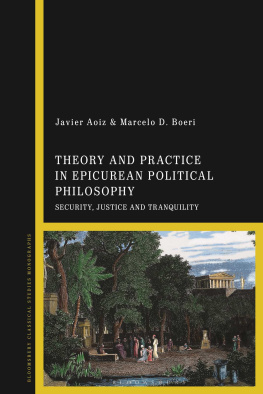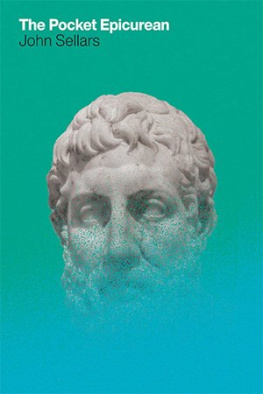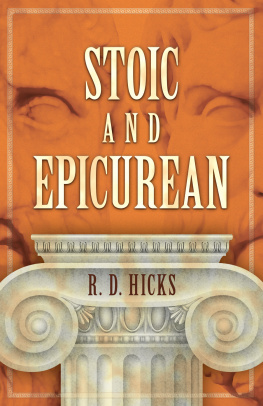Notes
BOOK I
MATTER AND VOID
. Venus: Goddess of love, and, for Lucretius, the symbol of creativity, sexual energy and nature.
. Pleasure: Latin voluptas, Greek hedone, a key tenet of Epicurean philosophy; its presence at the opening of the poem (in the original, the last word of the first line) is emphatic.
. airy tribe of birds through the heart: Cf. Chaucers prologue to The Canterbury Tales (lines 911):
And smale foweles maken melodye,
That slepen al the nyght with open y
So priketh hem nature in hir corages
[so does Nature pierce them in their hearts]
Also see Edmund Spensers incomparable rendition of the proem in The Faerie Queene, 4.10.44:
Great Venus, Queene of beautie and of grace,
The ioy of Gods and men, that vnder skie
Doest fayrest shine, and most adorne thy place,
That with thy smyling looke doest pacifie
The raging seas, and makst the stormes to flie;
Thee goddesse, thee the winds, the clouds doe feare,
And when thou spredst thy mantle forth on hie,
The waters play and pleasant lands appeare,
And heauens laugh, & al the world shews ioyous cheare.
. Mars: Lucretius uses the archaic form Mavors. The pairing of Mars and Venus suggests the Empedoclean notion of Love and Strife as the opposing forces of the universe; see Introduction, p. xii.
. so often lies your lips: Cf. Byrons Childe Harolds Pilgrimage (4.51):
In all thy perfect Goddess-ship, when lies
Before thee thy own vanquishd Lord of War?
And gazing in thy face as toward a star,
Laid on thy lap, his eyes to thee upturn,
Feeding on thy sweet cheek! while thy lips are
With lava kisses melting while they burn,
Showerd on his eyelids, brow, and mouth, as
from an urn?
. hour of need: Rome during Lucretius lifetime was in a constant state of unrest, the Republic in its death throes; hoc patriai tempore iniquo at this critical moment for the country might also refer specifically to the period from the second Catilinarian conspiracy in 63 BC to the First Triumvirate in 60 BC, or to Memmius governorship of 58 BC.
. For godhead by anger: Some feel these five lines are misplaced they also occur in II.64551 (in the Oxford Classical Text II.64651).
. the first was Greek: Epicurus, although Leucippus and Democritus had laid the foundations for his atomist vision of the world.
. Religion: I am using Religion and Superstition interchangeably in these passages. The Latin is religio. Lucretius is not against piety but the evils of organized religion.
. The Virgins altar Iphigenia: The virgin (here, the Virgin of the Crossroads) is Artemis. A tripartite goddess, she is the virgin goddess of the hunt, the goddess of childbirth, and is associated with Hecate, goddess of the underworld and black magic. (The Virgin of the Crossroads represents this last guise.) Offended by the slaughter of a sacred hind, Artemis caused contrary winds to prevent the Greek fleet from leaving the harbour at Aulis and setting sail for Troy. To appease the goddess, the Greeks sacrificed Iphigenia, daughter of Agamemnon, leader of the Greek expedition. She was told she was to be married to Achilles and was led as a bride to the altar.
. fillet: Latin infula, a red and white band of tufts of wool that marked the sacrificial victim.
. So potent was Religion in persuading to do wrong: Line 101 is one of the most famous lines in the poem: tantum religio potuit suadere malorum. Voltaire believed it would last as long as the world. (See also Introduction, p. xi.)
. waters yield change places with each other: The Platonic theory of spatial displacement (see the Timaeus, Plato 79b) which was accepted by Aristotle and the Stoics, was that movement was possible without void because all the moving parts (as of water) could simultaneously shift position.
. the two: Void and substance.
. rape of Helen war: Reference to the abduction by the Trojan prince Alexander (aka Paris) of Helen, wife of king Menelaus of Sparta, which sets off the Trojan War.
. vintage waters poured in: In the ancient world, wine was usually served mixed with water.
. air and water, earth and fire: The four roots or elements of Empedocles, from which he thought the universe composed, combined and separated under the respective sways of the forces of Love and Strife. Each root in turn was taken by different philosophers to be the basis for existence. See Book V, note 16.
. each species stays the same: This seems to approach the notion of genes.
. Heraclitus: See Glossary. He was known as the dark one because of the obscurity of his writings.
. they: Philosophers of the doctrine that all comes from fire.
. as that man claims: Heraclitus.
. homoeomery: Of like parts; things are infinitely divisible into parts like each other and like the whole (keep dividing a hair and you will have smaller and smaller pieces of hair). All substances contain a portion of all other substances, though whatever substance predominates determines what a thing is. Flesh can be made by eating bread because bread contains tiny portions of flesh in it, and so on.
. []: For this lacuna Bailey in his Commentary gives the sense must consist of things unlike themselves, which in their turn must contain things unlike themselves.
. maple flame: The anagrammatic pun in Latin is on lignis (wood) and ignis (fire).
. elements salty tears: Lucretius favourite rhetorical device, reductio ad absurdum. If everything is made of miniature copies of itself, then our atoms must surely be capable of emotion!
rivals of the Epicureans), although the notion that all tends to a centre was also advanced by the Old Academy and the Peripatetic philosophers, the followers of Plato and Aristotle respectively.
. How can this be if everything of earth tends to the middle?: The lacuna begins here. I have supplied this line to finish the sense of the two previous lines. Lines 10941101 were lost when a page of the Archetype manuscript (from which all copies descend) was damaged. The other side of the same page also suffered damage the ends of lines 106875, where Munros restorations have been followed.
BOOK II
THE DANCE OF ATOMS
. palace: See the description of the palace of the Phaeacians in Homer, Odyssey 7.100102:
Here, too, were boys of gold on pedestals
holding aloft bright torches of pitch pine
to light the great rooms, the night-time feasting.
(trans. Robert Fitzgerald, 1961)
. Field of Mars: The Campus Martius was part of the flood plain outside the walls of Rome lying in the bend of the Tiber. It was the site of military exercises.
. fleet of ships spread far and wide: In mock naval battles.
. Passing on lifes torch, like relay runners in a race: The metaphor comes from the Athenian torch relay-race (Lampadedromia), performed on horseback, in honour of the Thracian goddess Bendis. Plato uses the race as a metaphor for the handing on of life from one generation to the next in his Laws (776b). This passage in Lucretius gives the title to Sir Henry Newbolts popular 1897 poem, Vita Lampada, which closes:
This they all with a joyful mind
Bear through life like a torch in flame,
And falling fling to the host behind
Play up! play up! and play the game!
. []: The lacuna here is probably lengthy maybe as many as 52 lines, if a page of the Archetype was missing.












